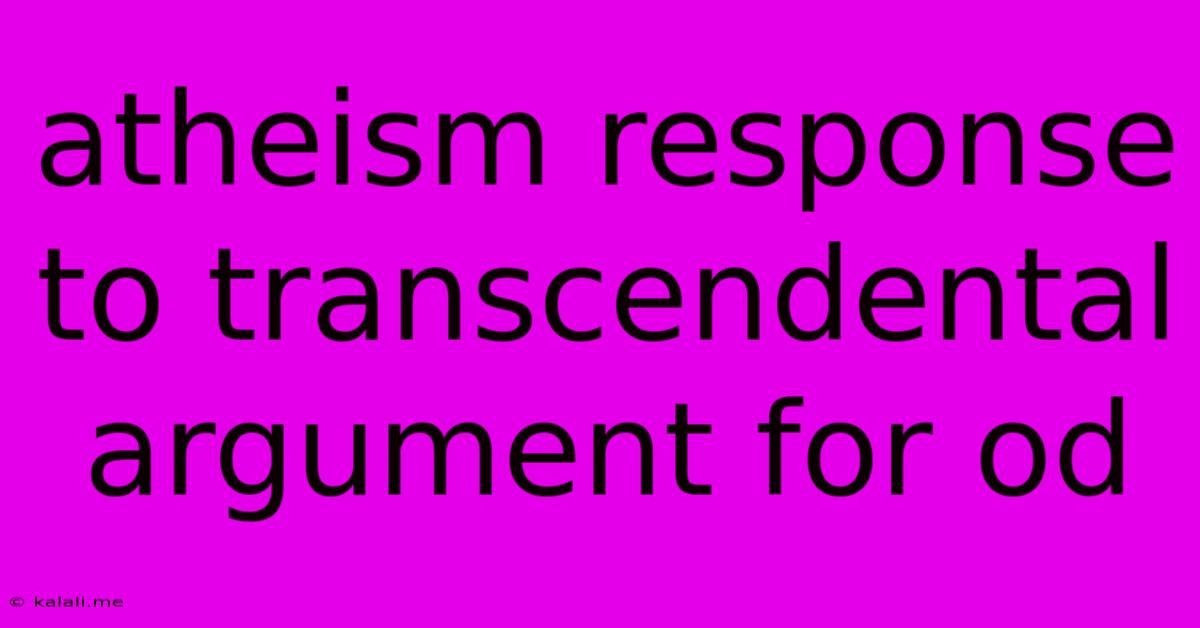Atheism Response To Transcendental Argument For Od
Kalali
Jun 06, 2025 · 3 min read

Table of Contents
Atheist Responses to the Transcendental Argument for God
The transcendental argument for God's existence posits that certain features of our experience, like morality, reason, or consciousness, are inexplicable without positing a transcendent cause – God. This argument, while influential, faces significant challenges from atheist perspectives. This article will explore several key atheist responses to this influential theological argument. Understanding these counterarguments provides a clearer picture of the ongoing debate surrounding the existence of God.
The core of the transcendental argument hinges on the claim that certain aspects of human experience are inherently transcendental, meaning they transcend the purely material or natural world. Therefore, their existence necessitates a supernatural explanation, namely God. Atheists, however, offer diverse counterarguments, challenging both the premise and conclusion of this argument.
1. The Problem of Explanatory Power
A primary atheist critique centers on the argument's limited explanatory power. While the argument might point to the "unexplainable" nature of certain phenomena, atheists argue that simply labeling something "unexplainable" doesn't automatically equate to divine intervention. Science, throughout history, has successfully explained phenomena previously considered inexplicable. The current lack of a complete scientific understanding doesn't necessitate a supernatural explanation; it simply indicates the incompleteness of our current knowledge. This gap in understanding could be filled by future scientific discoveries, rendering the transcendental argument premature.
Furthermore, the argument often suffers from the fallacy of the god-of-the-gaps. This fallacy involves attributing unexplained phenomena to God, only to have science later provide a natural explanation. Atheists argue this pattern demonstrates the inherent weakness of invoking God as an explanation for gaps in our current scientific understanding.
2. Alternative Explanations and Naturalism
Atheists often offer alternative, naturalistic explanations for the phenomena cited in the transcendental argument. For instance, morality could be explained through evolutionary biology, focusing on the adaptive benefits of cooperation and empathy. Reason and consciousness, while complex, are areas of active scientific investigation, with neuroscientific and cognitive studies continually advancing our understanding of their mechanisms. While complete understanding may be elusive, the ongoing progress in these fields undermines the necessity of a divine explanation. The overarching principle here is naturalism: the belief that the natural world is self-contained and does not require supernatural intervention.
3. The Problem of Evil and Suffering
The existence of pervasive suffering and evil in the world presents a significant challenge to the transcendental argument. If God is responsible for creating and sustaining the universe, and if God is both all-powerful and all-good, why does so much suffering exist? Atheists argue that the presence of gratuitous suffering is incompatible with the existence of an all-powerful and all-good God. This argument, known as the problem of evil, significantly weakens the appeal of the transcendental argument, suggesting an alternative framework for understanding the world.
4. The Question of God's Nature
The transcendental argument often relies on a particular conception of God – a powerful, intelligent being directly involved in the creation and maintenance of the universe. Atheists argue that this conception of God is itself problematic, and that there's no compelling reason to accept it. Alternative conceptions of God, or indeed the absence of God entirely, are equally valid possibilities. The argument's success depends heavily on pre-supposing a specific theological framework, a framework that atheists may not accept.
Conclusion
The transcendental argument for God's existence, while influential, faces considerable challenges from atheist perspectives. Criticisms focus on the argument's limited explanatory power, the availability of naturalistic alternatives, the problem of evil, and the questionable assumptions about God's nature. While the argument may hold appeal for some, a thorough examination of these counterarguments is crucial for a complete understanding of the ongoing debate surrounding the existence of God. The debate remains active and complex, requiring careful consideration of both sides of the argument.
Latest Posts
Latest Posts
-
Shower Leaking Into Outside Wall Carpet
Jun 07, 2025
-
My Cat Is Not Stimulated Vyb Anything
Jun 07, 2025
-
Microwave Transformer How Many Amps Out Put
Jun 07, 2025
-
Docketed New Case Ready For Examination
Jun 07, 2025
-
How Many Led Lights On A 15 Amp Circuit
Jun 07, 2025
Related Post
Thank you for visiting our website which covers about Atheism Response To Transcendental Argument For Od . We hope the information provided has been useful to you. Feel free to contact us if you have any questions or need further assistance. See you next time and don't miss to bookmark.